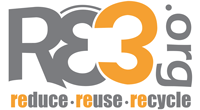RALEIGH – Total recovery from local government recycling programs dropped by more than 90,000 tons last year as revealed in a recent analysis conducted by the N.C. Department of Environment and Natural Resources.
According to the FY 07-08 Solid Waste Management Annual Report and an annual performance analysis conducted by the department, recovery from local government programs fell from almost 1.35 million tons to approximately 1.26 million tons. The 90,000 ton decrease represents a 6.8 percent decrease in recovery. During the same period, waste disposed in North Carolina fell roughly 4.7 percent. The analysis identified decreases in yard waste recovery and tire recycling as the primary reasons for the overall decline in recovery.
“Despite this drop in recovery, there are some very positive trends,” said Jim Hickman, local government assistance team leader for the state Division of Pollution Prevention and Environmental Assistance. “If you look at the materials commonly accepted in curbside recycling programs, such as paper and beverage containers, you’ll actually find that tonnage continued to climb. The decline in yard waste recovery is mostly due to the drought – in normal years, yard waste would be 10 to 15 percent higher. However, overall there is still a lot of room for improvement in local recycling efforts.”
The analysis shows that when yard waste and tire recovery data were removed, the state experienced relatively strong recycling growth during the last decade with raw tonnage increasing by more than 28 percent and per capita recovery increasing by more than 10 percent. The average county per capita recovery rate, excluding tires and yard waste, fell slightly from last fiscal year to approximately 113 pounds per capita, while the counties with the top 10 recovery rates remained relatively unchanged.
“Improving the performance of local recycling programs has never been more important to North Carolina, especially when it comes to economic development,” according to Scott Mouw, chief of the Community and Business Assistance Section of the state Division of Pollution Prevention and Environmental Assistance. “We have companies in the state that rely on the flow of materials from recycling programs to sustain and create new jobs. If we are able to meet our ambitious goal to recycle 2 million tons annually from local programs by 2012 and if we successfully implement the upcoming disposal bans plastic bottles, wooden pallets and oil filters, the result will be new employment opportunities for North Carolinians.”
As an example, in the past year, two plastic recycling companies made major commitments to creating recycling jobs in the Carolinas. NURRC LLC recently expanded a PET plastic recycling facility in Spartanburg, S.C. The plant is expected to recycle more than 100 million pounds of soda and drink bottles each year. Most of the recycled resin produced at the plant is shipped to Southeastern Container in Enka, where it is turned back into new soda bottles. And Clear Path Recycling LLC recently announced that it will build a PET plastic recycling facility in Fayetteville. The plant is expected to create 100 new jobs and consume 280 million pounds of recycled soda and drink bottles each year.
A list detailing per capita annual recycling rates for each North Carolina county can be found here. The totals include tonnage recycled by both county and municipal programs within the county. Yard waste, tires and some special wastes are excluded from the totals to allow consistent comparisons from year-to-year.

2 comments:
Shouldn't the headline read "data send mixed signals?" I thought that "data" was always plural.
Grammar nitpicking aside, thanks for the update. Wonder why recycling fell more than garbage last year?
To me this trend is based on the depressed economy. People are just more concerned with getting by and ignoring recycling. It's a sad development and I can't back it up with stats. I've taken to composting in my mulch piles for the first time. Only time will tell if don't just create a seperate compost heap.
Post a Comment